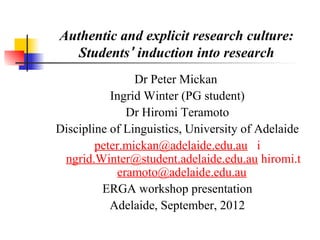
Authentic and explicit research culture
- 1. Authentic and explicit research culture: Students’ induction into research Dr Peter Mickan Ingrid Winter (PG student) Dr Hiromi Teramoto Discipline of Linguistics, University of Adelaide peter.mickan@adelaide.edu.au i ngrid.Winter@student.adelaide.edu.au hiromi.t eramoto@adelaide.edu.au ERGA workshop presentation Adelaide, September, 2012
- 2. Inquiry: action research, reflective practitioner Research identity & professional practice Practitioner managed Classroom research Qualitative/naturalistic studies Relevant investigations Collaborative—in community Resource-based—people + information Documentation & reporting
- 3. Instruction in higher education Limitation of the transmission model of instruction is the representation of information as known and established The experience inhibits inquiry and limits scope for discovery re-conceptualisation of the nature of academia and its role in wider society responsibility to generate innovation through academic & industry links What constitutes academic work?
- 4. Inquiry-based instruction Research & teaching tended to be treated as separate academic activities (Schapper and Mayson, 2010) University of Adelaide 2008-2012 strategic plan identifies innovation and creativity (University of Adelaide, n.d) as priorities Curriculum design in Higher education (Mickan 2012): what specific practices & discourses [texts] characterise a subject, which students need to manage?
- 5. Language learning—why inquiry-based instruction? Multiple, conflicting theories: cognitive, structural, behaviourist, acquisition v. learning, naturalistic, social theory, acquisition v. learning etc Contradictory research methods: quantitative, experimental, ethnographic, naturalistic, case study etc. ????????????????????????????
- 6. Students’ experiences of learning languages Knowledge base related to LL: Universal, normal, shared, natural Vast experience of different texts Study of Language Learning is learning academic practices & discourses or texts associated with LL (transforming experience into meanings!)
- 7. Theories of language & learning: Socialisation & semiotic Social theory of language learning: learning through conversing naturally & purposefully with people Language functional in social context Halliday (1978) Language as social semiotic—a resource for making meanings “… all knowledge is like this: to “know” something is to have transformed it into meaning, and what we call “understanding” is the process of that transformation” (Halliday in Webster (ed): 2)
- 8. Language learning: ideal for inquiry-based instruction Common & shared realities Naturalistic documentation Students select focus Exploration & application of theory of LL Collaborative opportunities
- 9. Language learning: the course In this subject we will explore our most important social experience – learning language – learning to speak to write and read and learning to make sense of the world with language. We will look at child language learning and how the social relationships of childhood influence our language learning. We will examine second language acquisition. Bilingualism is another topic. Literacy is a controversial topic so we need to look at what literacy is and how we develop the multileracies for living in a high tech information age.
- 10. Objectives To examine language development as a social experience To review leading-edge research on language learning To evaluate theories of language learning To analyse child language development data To examine second language acquisition experiences To develop frameworks for probing issues such as bilingualism and language learning difficulties To develop practical skills in researching questions within the field of language learning To apply findings of research in society, for example in education.
- 11. Task 1 Potential for inquiry? What is the potential for students” inquiry? Open-ended? Possible questions? Possible topics? What course-specific practices do students participate in?
- 12. References Halliday, M. A. K. 1978. Language as social semiotic: The social interpretation of language and meaning. London: Edward Arnold. Halliday, M. in Webster (ed) 2009 The essential Halliday. London, Continuum Mickan, P. 2012. Language curriculum design and socialisation. Brighton, Multilingual Matters
